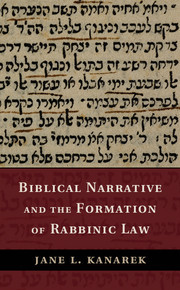Description
Biblical Narrative and the Formation of Rabbinic Law
Author: Kanarek Jane L.
This book presents a new framework for understanding the relationship between biblical narrative and rabbinic law.
Language: English
Subject for Biblical Narrative and the Formation of Rabbinic Law:
Approximative price 111.54 €
In Print (Delivery period: 14 days).
Add to cart
Publication date: 07-2014
Support: Print on demand
Support: Print on demand
Description
/li>Contents
/li>Biography
/li>
This book presents a new framework for understanding the relationship between biblical narrative and rabbinic law. Drawing on legal theory and models of rabbinic exegesis, Jane L. Kanarek argues for the centrality of biblical narrative in the formation of rabbinic law. Through close readings of selected Talmudic and midrashic texts, Kanarek demonstrates that rabbinic legal readings of narrative scripture are best understood through the framework of a referential exegetical web. She shows that law should be viewed as both prescriptive of normative behavior and as a meaning-making enterprise. By explicating the hermeneutical processes through which biblical narratives become resources for legal norms, this book transforms our understanding of the relationship of law and narrative as well as the ways in which scripture becomes a rabbinic document that conveys legal authority and meaning.
1. Introduction; 2. He took the knife: the binding of Isaac as ritual resource; 3. The paradigmatic virgin: Rebekah's marriage and exegetical choice; 4. Avoiding the obvious: Joseph's disappearance and the creation of legal meaning; 5. Textual fragmentation and an assembly of ten; 6. Conclusion.
Jane L. Kanarek is Assistant Professor of Rabbinics at Hebrew College. Her work has been published in AJS Review, Teaching Theology and Religion, the Journal of Jewish Education, and Sh'ma Journal: A Journal of Jewish Ideas. She is on the editorial board of Teaching Theology and Religion and a member of the Committee on Jewish Law and Standards of the Rabbinical Assembly. She earned her PhD from the University of Chicago, her MA from the Jewish Theological Seminary, and her AB from Brown University. She received a Wexner Graduate Fellowship.
© 2024 LAVOISIER S.A.S.




